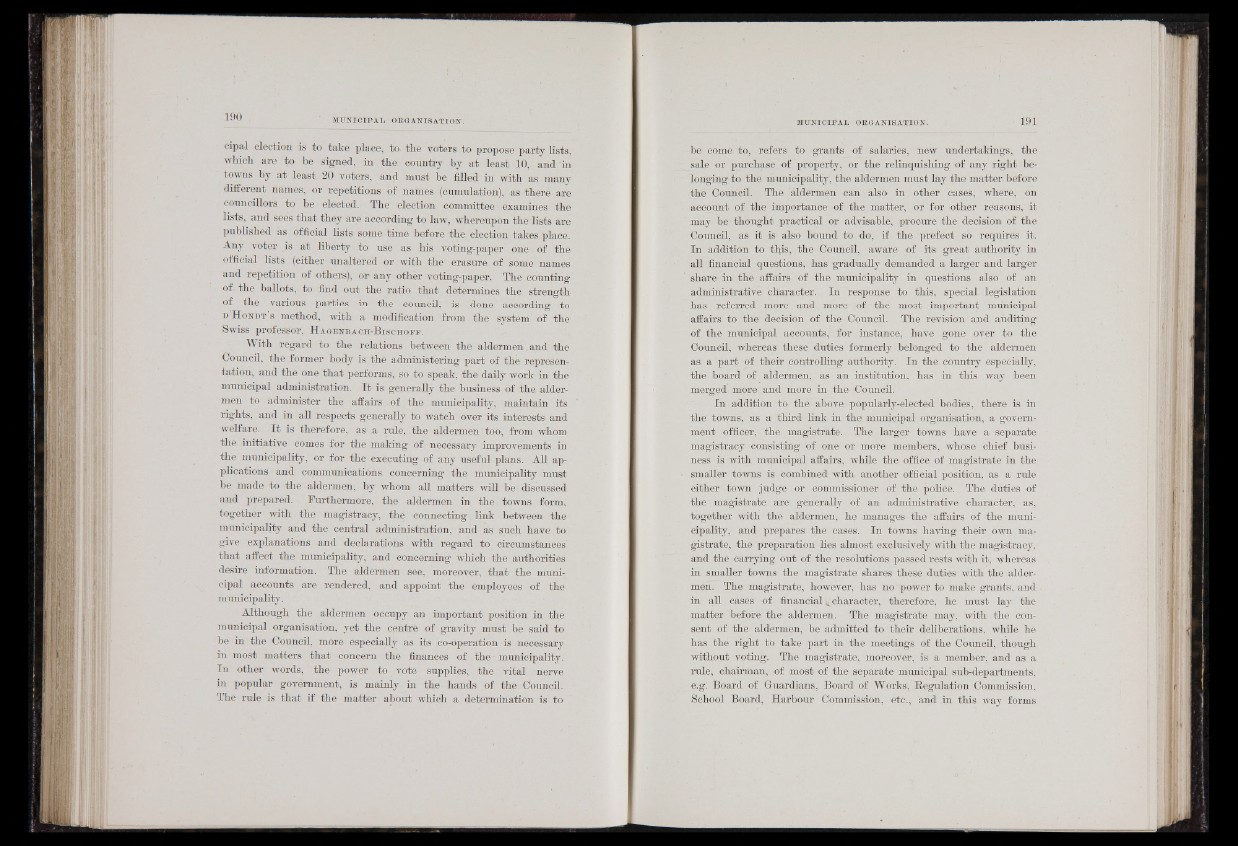
cipal election is to take place, to- the voters to propose party lists,
which are to be signed, in the country by at least 10, and in
towns by at least 20 voters, and must be filled in with as many
different names, or repetitions of names (cumulation), as there are
councillors to be elected. The election committee examines the
lists, and sees that they are according to law, whereupon the lists are
published as official lists some time before the election takes place.
Any voter is at liberty to use as his voting-paper one of the
official lists (either unaltered or with the erasure of some names
and repetition of others), or any other voting-paper. The counting
of. the ballots, to find out the ratio that determines, the strength
of the various parties in the council, is done according to
d H o n d t ' s method, with a modification from the system of the
Swiss professor, H a g e n b a c h -B i s c h o i t .
With regard to the relations between the aldermen,and the
Council, the former body is the administering part of the representation,
and the one that performs, so to speak, the daily work in the
municipal administration. I t is generally the business of the aldermen
to administer the affairs of the municipality, maintain its
rights, and in all respects generally to watch over its interests and
welfare. I t is therefore, as .à rule, .the aldermen too, from whom
the initiative comes for the making of necessary improvements in
the municipality, or for the executing of any useful plans. All applications
and communications concerning the municipality must
be made to the aldermen; by whom all matters will be discussed
and prepared. Furthermore, the aldermen in the towns form,
together with the magistracy, the connecting link between the
municipality and the central administration, and as such have to
give explanations and declarations with regard to circumstances'
tha t affect the municipality, and concerning which the authorities
desire information. The aldermen see, moreover, that the municipal
accounts are rendered, and appoint the employees of the
municipality.
Although the aldermen occupy an important position in the
municipal organisation, yet the centre of gravity must be said to
be in the Council, more especially as its co-operation is necessary
in most matters that concern the finances of the ■ municipality.
In other words, the power to vote supplies, the vital nerve
in popular government, is mainly in the hands of the Council.
The rule is that if the matter about which a determination is to
be come to, refers to grants of salaries, new undertakings, the
sale or purchase of property, or the relinquishing of any right belonging
to the municipality, the aldermen must lay the matter, before
the Council. The aldermen can also in other cases, where, on
account of the importance of the matter, or for other reasons, it
may be thought practical or advisable, procure the decision of the
Council, as it is also bound to do, if the prefect so requires it.
In addition to this, the Council, aware of its great authority in
all financial questions, has gradually demanded a larger and larger
share in the affairs of the municipality in questions also of an
administrative character. In response to this, special legislation
has .referred more and more of the most, important municipal
affairs to the decision of the Council. The revision and auditing
of the municipal accounts, for instance, have gone over to the
Council, whereas these duties formerly belonged to the aldermen
as a part of their controlling authority. In the country especially,
the board of aldermen, as an institution, has in this way been
merged more and more in the Council.
In addition to the above popularly-elected bodies, there is in
the towns, as a third link in the municipal organisation, a government
officer, the magistrate. The larger towns have a separate
magistracy consisting of one or more members, whose chief business
is with municipal affairs, while the office of magistrate in the
smaller towns is Combined with another official position, as a rule
either town judge or commissioner of the police. The duties of
the magistrate are generally of an administrative character, as,
together with the aldermen, he manages the affairs of the municipality,
and prepares the cases. In towns having their own magistrate,
the preparation lies almost exclusively with the magistracy,
and the carrying out of the resolutions passed rests with it, ryhereas
in smaller towns the magistrate shares these duties with the aldermen.
The magistrate, however, has no power to make grants, and
in all cases of financial g character, therefore, he must lay the
matter before the aldermen. The magistrate may, with the consent
of the aldermen, be admitted to their deliberations, while he
has the right to take part in the meetings of the Council, though
without voting. The magistrate, moreover, is a member, and as a
rule, chairman, of most of the separate municipal sub-departments,
e.g. Board of Guardians, Board of Works, Regulation Commission,
School Board, Harbour Commission, etc., and in this way forms